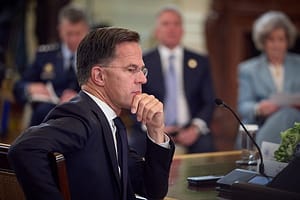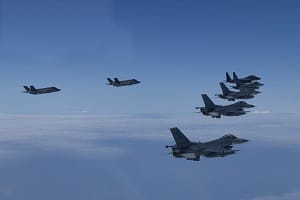European Union nations have developed a reputation for underfunding their militaries, particularly within NATO; the concern intensified during Donald Trump’s first presidency, when he repeatedly urged alliance members to increase defense spending.
Despite such a perception, Finbold research found that the EU has rapidly increased its total military spending over the last ten years.
Between 2014 and 2024, EU nations more than doubled military spending, rising from €147 billion (~$154.6 billion) to €326 billion (~$342.8 billion)
Over the last decade, the European Union raised its defense expenditure by 121.77%, and the share of its gross domestic product (GDP) benefitting the armed forces rose from 1.3% to 1.9%, according to the data Finbold retrieved from the European Council.
Within the same timeframe, the US military budget increased by approximately 39%, China’s by about 75%, and Russia’s by an estimated 102%.
Why the EU has been increasing its defense spending
The comparison with Russia’s expenditure increase is arguably especially important as the ‘little green men’ incident of 2014, the special forces operation that led to Crimea being occupied and joining the Federation in a controversial referendum, was a major catalyst for the EU’s military spending.
Before 2014, EU defense spending was in decline, largely due to budget cuts following the 2008 financial crisis. Between 2008 and 2014, member nations reduced military expenditures by 7.55% from €159 billion (~$167.21 billion)—1.5% of GDP—to €147 (~$154.59 billion)—1.3%.
Interestingly, the biggest one-year increase ahead of the economic crisis might also have been linked to Russia, as it occurred between 2007 and 2008.
The overall deterioration in relations between the collective West and the Russian Federation is often linked to President Vladimir Putin’s infamous speech at the 2007 Munich Security Conference.
Despite the relatively long history of the link between the EU’s military expenditures and the activity of its eastern neighbor and the undeniable impact of the start of the Russo-Ukrainian war in 2014, the most dramatic catalyst for actual spending and public discourse came with the invasion of Ukraine in 2022.
Across the three years ending in 2024, the European Union countries raised their budgets by 35.83%—a figure comparable to the US’ increase since 2014.
Which EU countries are spending the most on military
Among the individual countries, Germany took the lead as the biggest spender, with its budget hitting €51.95 billion (~$54.63 billion) in 2024 and an even higher €71.75 billion (~$75.46 billion) once the second tranche of special assets is included.
In 2022, the former Chancellor announced a special €100 billion (~$105.16 billion) to improve, modernize, and strengthen the Bundeswehr.
France, on the other hand, remained a stable major spender, with a 2024 military budget of €47.2 billion (~$49.64 billion).
The country’s military has been more involved in overseas operations than most of the other forces from the continent, and it is seeking to maintain its old status as the strongest army in Europe.
Despite being known as something of a dove in the Global North due to its refusal to go into Iraq, France has a reputation of being the most aggressive imperial power other than the US in many parts of the Global South.
Lastly, Poland has been taking the lead in terms of sheer upscaling. The Eastern European nation has been engaged in extensively supplying Ukraine, modernizing its forces, and reforming it with the inclusion of a territorial defense component in accordance with a wider Baltic policy.
In 2014, the annual budget of the Polish Armed Forces stood at $10.5 billion —1.9% of the GDP—and increased by only 33.33% by 2022 to $14 billion—2.2% of the GDP. By 2024, the situation rapidly changed as expenditures soared 185.71% to a staggering $40 billion—4.67% of the GDP.
In total, Poland’s military spending has rocketed 280.95% in the last 10 years and is poised to increase even further to $47 billion in 2025.
Is the EU set to overtake the US in military spending?
In addition to the increases already made, the EU appears poised to accelerate the improvements in its overall military infrastructure even further. Donald Trump’s re-entry into the White House has greatly reduced the confidence of America’s allies in the superpower’s willingness to continue offering protection.
In late February and early March 2025, the situation deteriorated even further as Elon Musk, the billionaire close to the President, began pushing for the US to leave both NATO and the UN—an alarming prospect for the bloc that has come to rely on American hard power extensively.
In response, Ursula von der Leyen, the President of the European Commission, revealed that the EU might invest as much as €800 billion (~$841.31 billion) into its defense in the coming years.
Why the EU might not achieve its defense spending goals
Still, the actual execution of the project may not be entirely certain and is likely to depend on Europeans’ appetites for spending more on the armed forces, as well as factors such as possible resolutions to the French, German, Romanian, and Greek political crises and the outcome of the possible Commission corruption scandal.
Finally, it is worth pointing out that both the reported figures and the actual magnitude of the budget increase are subject to some uncertainty. To begin with, though the EU is spending more than both Russia and China on its militaries on paper, the actual effectiveness of the money is somewhat uncertain.
Indeed, given their domestic industrial capacity and purchasing power parity (PPP), the Russian Federation and the People’s Republic are likely to achieve more with the budgets they are committing.
The potential impact is further compounded by the long-standing allegations that both powers spend significantly more than they officially report—a likely setup given that Western powers are known to employ similar tactics as best exemplified by the US’ dubious reporting practices in the cases of the Iraq and Afghanistan war, and the Pentagon’s continued failures to pass financial audits.
Potentially rocketing costs might prove another avenue for inefficiency in the EU’s military plans as, in recent years, there have been numerous, if vague and dubious reports of what could best be described as price gouging on the part of some defense contractors such as Rheinmetall.
Get real time update about this post category directly on your device, subscribe now.






Leave a Comment